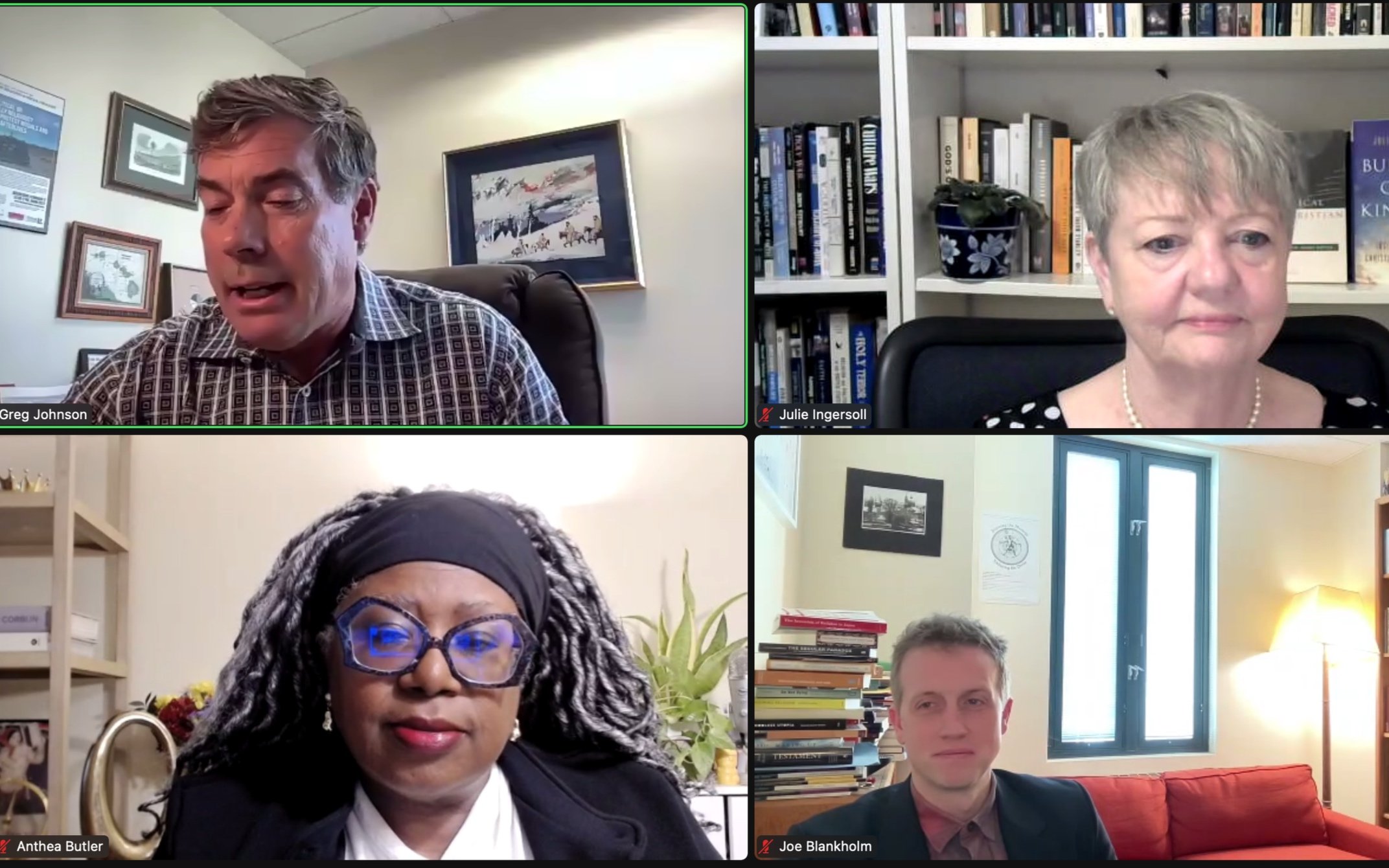By Claire Yacoboski
Christian nationalists have mobilized for the 2024 election, aiming to institute a theocratic government with Christians in “every area of power,” says Anthea Butler, chair of the religious studies department at the University of Pennsylvania.
“There has been a significant increase in the mobilization of these beliefs,” she told a UC Santa Barbara audience last week, describing the effort of evangelicals to "establish a Christian nation.”
Butler is author of a book on the influence of Christian nationalism titled White Evangelical Racism: The Politics of Morality in America. She spoke on a panel hosted by UCSB’s Walter H. Capps Center, together with religion professors Julie Ingersoll of the University of North Florida, and UCSB’s Joseph Blankholm. Panelists discussed the intersection of religion and politics and how these dynamics are shaping the current election landscape.
Greg Johnson, director of UCSB’s Walter H. Capps Center, upper left, introduces panelists Anthea Butler, lower left, Julie Ingersoll, upper right, and Joseph Blankholm, before their discussion about religion and its influence on the 2024 election.
Butler said a theocratic ideology has found new energy in recent years, particularly among evangelical groups who are “organizing now more than ever.” She addressed the contradiction of evangelical support for Donald Trump, a figure whose actions often clash with evangelical Christian values, saying that for these religious actors morality is not the focus—power is. They see Trump as a means to an end, the best vehicle for achieving their political and religious goals, even if he personally doesn’t embody their ideals, Butler said. A prime example is initiatives such as Project 2025, a political strategy aimed at enshrining Christian values in government policy.
Butler warned of potential violence surrounding the 2024 election. Based on the the Jan. 6, 2021 storming of the capitol, she anticipates similar forms of violence could arise as conspiracies fuel fear and uncertainty, particularly if the election results are contested.
Author and North Florida University professor Julie Ingersoll linked Christian nationalism to a broader authoritarian movement, saying these groups operate with “permeable borders,” blending ideas and practices that overlap and sometimes contradict one another. Evangelicals, Catholics, charismatics, and other Christian factions, while distinct, have found common ground in their opposition to pluralism and their desire to impose biblical law on society, she said.
Ingersoll said that the charismatic and Pentecostal branches of Christianity also see supporting Trump as a form of “spiritual warfare.” For these believers, she said, “spiritual warfare is not metaphorical” but a literal battle between good and evil. Figures like Trump are often cast as biblical figures—such as Cyrus or Jehu—chosen by God to lead this fight, Ingersoll explained. The demonization of political opponents, such as portraying Vice President Kamala Harris with racist or misogynistic tropes, serves to justify violence in the eyes of Christian nationalists.
Former President Donald Trump receives prayers from Christians at the National Faith Summit in Georgia on Monday, October 28, 2024, as Pastor Jack Graham calls Trump “a warrior for the word of God.”
UCSB’s Joseph Blankholm said religious implications go beyond the White House. “The election will have a huge impact on the judiciary,” he said. “And we will see those ripple effects in all kinds of ways for decades.”
Blankholm’s research has focused on the decline of religion in American society and he spoke on how that impacts the election. While Christian nationalism is on the rise in some quarters, overall religiosity is decreasing. Blankholm pointed to the growing number of “nones”—those who identify as atheist, agnostic, or unaffiliated with any religion — as a significant demographic shift. Currently about 28% of the U.S. population identifies as non-religious, and this group is becoming increasingly influential in politics, he said.
Still, Blankholm argued that the decline of religion does not necessarily benefit Democrats, as one might assume. He asserted that “nones,” who have disengaged from religion are often politically disengaged as well. They are the “least engaged in the American electorate,” Blankhom said. As well, many non-religious Americans hold a variety of political views, making them less predictable than their religious counterparts.
The panelists agreed that the stakes are high this year, particularly as religious groups continue to mobilize around issues of gender, family, and pluralism. The future of religious freedom, the judiciary, and democracy itself, hang in the balance, the audience heard.
Claire Yacoboski is a fourth-year UC Santa Barbara majoring in Communication. She is a Web and Social Media intern with the Division of Humanities and Fine Arts.



